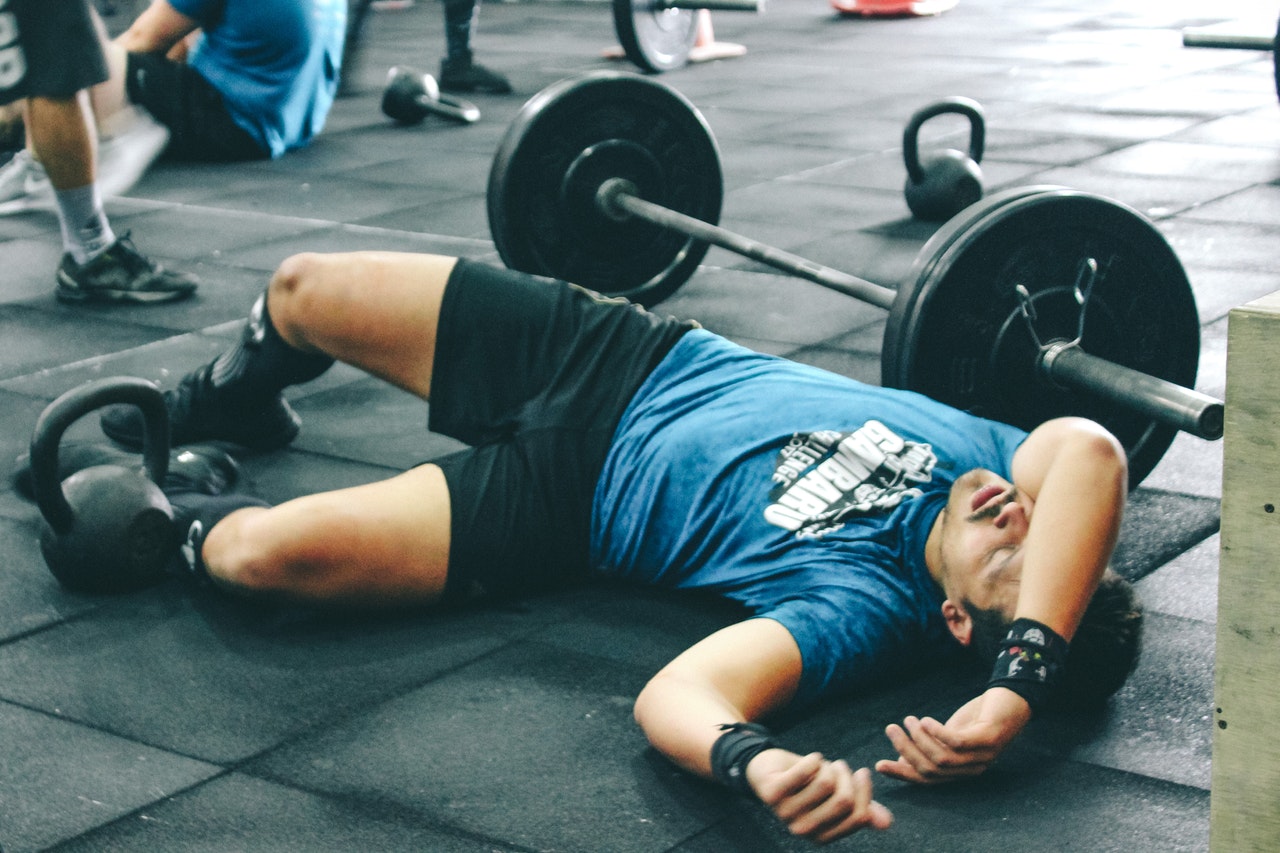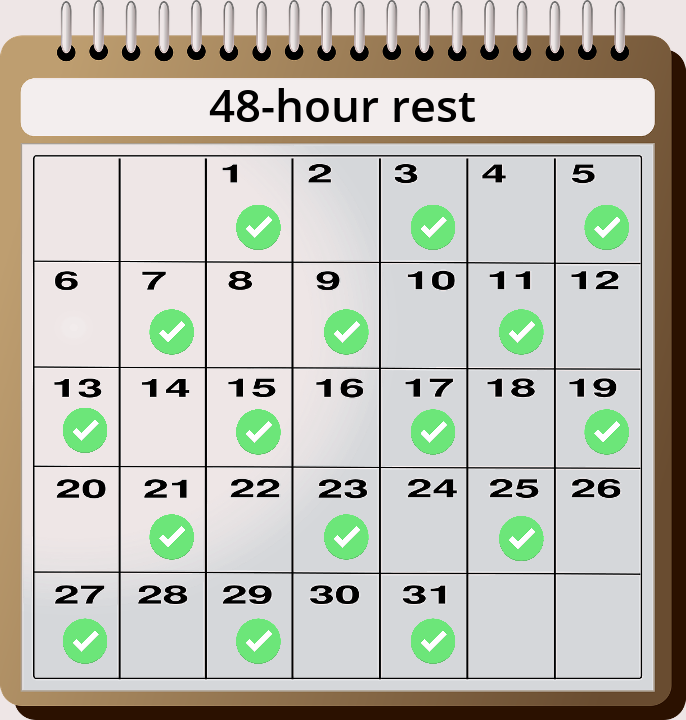 Most people consider that they need to work out until they’ve spent their energy. The feeling of energy is not a sign that there is more of the workout.
Most people consider that they need to work out until they’ve spent their energy. The feeling of energy is not a sign that there is more of the workout.
The feeling of strength or energy during the workout is not a measure for the length of the workout.
The feeling of strength or energy during the day after the workout, is not a sign that you should work out that day.
How long and how often to work out
If we adhere to these principles, we’ll achieve:
- Faster progress
- A healthier body
- More time
- Less expenses for supplements
During the workout, if intensive, there is an increased production of the human growth hormone. Cortisol increases as well, regardless of the intensity of the workout. Around the 45th minute of the workout, growth hormone is in its highest level for that workout and then it starts to decrease. This is the best time to end the workout. The level of cortisol surpasses the level of testosterone and HGH around the 60th minute. Cortisol continues to rise for several hours after the workout. This is all normal.
Testosterone does not elevate during the workout as the growth hormone. Testosterone is a little different story in that it increases only during the recovery period, the rest day. (Whereas HGH jumps very high during the workout as well.)
The body is in a state of repair immediately after the workout, by using its stored substances. This is why protein and meal after the workout is of great help to the organism and helps lower the level of cortisol.
Immediately after the workout, testosterone and growth hormone are lower than before the workout. And cortisol is higher than before the workout. Here there are many other factors at play, such as workout intensity, the exercises chosen, your diet and other factors with direct and indirect influence. In our training and nutrition programs all this is taken care of.
Elevated cortisol can be described as an inertia caused by workouts. Meaning, when it increases as a result of the workout, it must perform its task. When it starts performing (as elevated) it has a certain period of “working hours”. The higher it was elevated, the longer its working hours. This means longer period of lowered testosterone because cortisol suppresses it.
 It is interesting that these effects occurring during and after you work out, are normal and desirable. After a certain number of hours, cortisol decreases under its before-workout level. (If the workout ended around the 45th minute.) This enables testosterone and growth hormone to jump higher than they were before and after the workout. This increase begins at around 36 hours after the workout and lasts until the 48th hour after the workout. This is when gains are made. If you hinder this process with a new workout the next day, no nutrition or supplements will replace or make up for it. That is one way how supplements become expensive, because you will prevent their efficacy. Unhindered, this process will increase the efficacy of your supplements, nutrition and the workouts themselves.
It is interesting that these effects occurring during and after you work out, are normal and desirable. After a certain number of hours, cortisol decreases under its before-workout level. (If the workout ended around the 45th minute.) This enables testosterone and growth hormone to jump higher than they were before and after the workout. This increase begins at around 36 hours after the workout and lasts until the 48th hour after the workout. This is when gains are made. If you hinder this process with a new workout the next day, no nutrition or supplements will replace or make up for it. That is one way how supplements become expensive, because you will prevent their efficacy. Unhindered, this process will increase the efficacy of your supplements, nutrition and the workouts themselves.
The next workout should be after 48 hours, i.e work out every other day. This is the period during which muscles have their highest growth-rate and during which excess fat gets burned (especially during sleep time).
The ideal duration of a workout is 45 minutes and no longer than 60 minutes. It is much better to increase weights or intensity (for example less rest between sets) than to increase the workout duration.
Here are some factors that influence this process:
- A workout lasting more than 60 minutes, causes additional increase of cortisol and increases its work-hours. This forbids the testosterone to rise higher, not permitting it to do its work which means depriving yourself of training gains.
- The intake of carbohydrates (they convert to sugars in the body) – suppresses the production of human growth hormone. Many companies in the supplement industry want you to believe that you need glucose (carbs that have been broken down into blood sugars) and that glucose is what creates the energy. Glucose gives energy but not THE energy. It is much more effective for the body to get energy by burning fats instead of sugars. (read why) Carbs reduce growth hormone and thus the gains, creating “need” to buy more supplements.
- Mental stress causes increased production of cortisol and this lowers testosterone and training gains.
- Everyday exercise does not allow growth hormone and testosterone to rise up to the level needed for optimum muscle-growth.
- Not having enough sleep pre or post workouts. Paradise for cortisol, hell for growth hormone.
- Protein shake before workouts and immediately after. It decreases duration of the elevated cortisol and speeds up elevation of growth hormone and testosterone.
- A meal 90 minutes before workouts and one in the next 60 minutes after (besides protein shake). This decreases the duration of the elevated cortisol and speeds up elevation of growth hormone and testosterone.
- Everything we said here.
As all of this pertains to the duration of a single workout, it is so pertains to workouts during a single week. It is not necessary to train 6-7 days in a week. The idea that if we train today another muscle group thus resting the one we trained yesterday, is wrong. The rest is needed to allow the hormones to rise up to the levels needed to enable gains between the workouts.
Assuming proper circumstances, testosterone elevates in the period of 24-48 hours after the workout on a higher level than before the workout. If you do not allow for the recovery period, i.e you exercise the next day again, testosterone doesn’t get a chance to rise. That way the gains from the workouts won’t “rise”. In that manner you keep cortisol high and testosterone low.
Rest days are intended for the hormonal system and not for the muscles or tiredness.
Not the duration but the intensity, explosiveness, weights and number of muscle groups included in workouts is what increases the growth hormone.
Strong hormonal response of testosterone and growth hormone lay the foundation on which the trained muscles will grow. If we train for example only biceps, that workout will not cause significant increase of growth hormone. But for sure it will cause increased cortisol! In order to have an effect from isolation exercises (and this is the “secret” of good abs): the body needs to be in a condition of increased growth hormone and testosterone production. (What kinds of exercises enable maximum hormonal response for the whole body?)
If training intensity is high, with heavy weights, with smaller breaks between sets, workouts should not last more than 45 minutes. Then, even 60 minutes may be too much.
If this principle about workout frequency is accompanied by workout program designed to elicit maximum hormonal response, and diet which additionally elicits and which does not hinder beneficial hormonal response, the results will be greater than any standard held formerly. This is what our programs do.
Follow these recommendations to have gains that will be far greater than the “normal maximum”. For this, you’ll be the first witness. Then other people’s good comments. And some critics too, “You are on steroids.”
– “No, I’m on muskultura.”







